1.Death by Amazon…IBUY is Internet Retail ETF….IBUY +30% YTD vs. XRT S&P Retail -12%
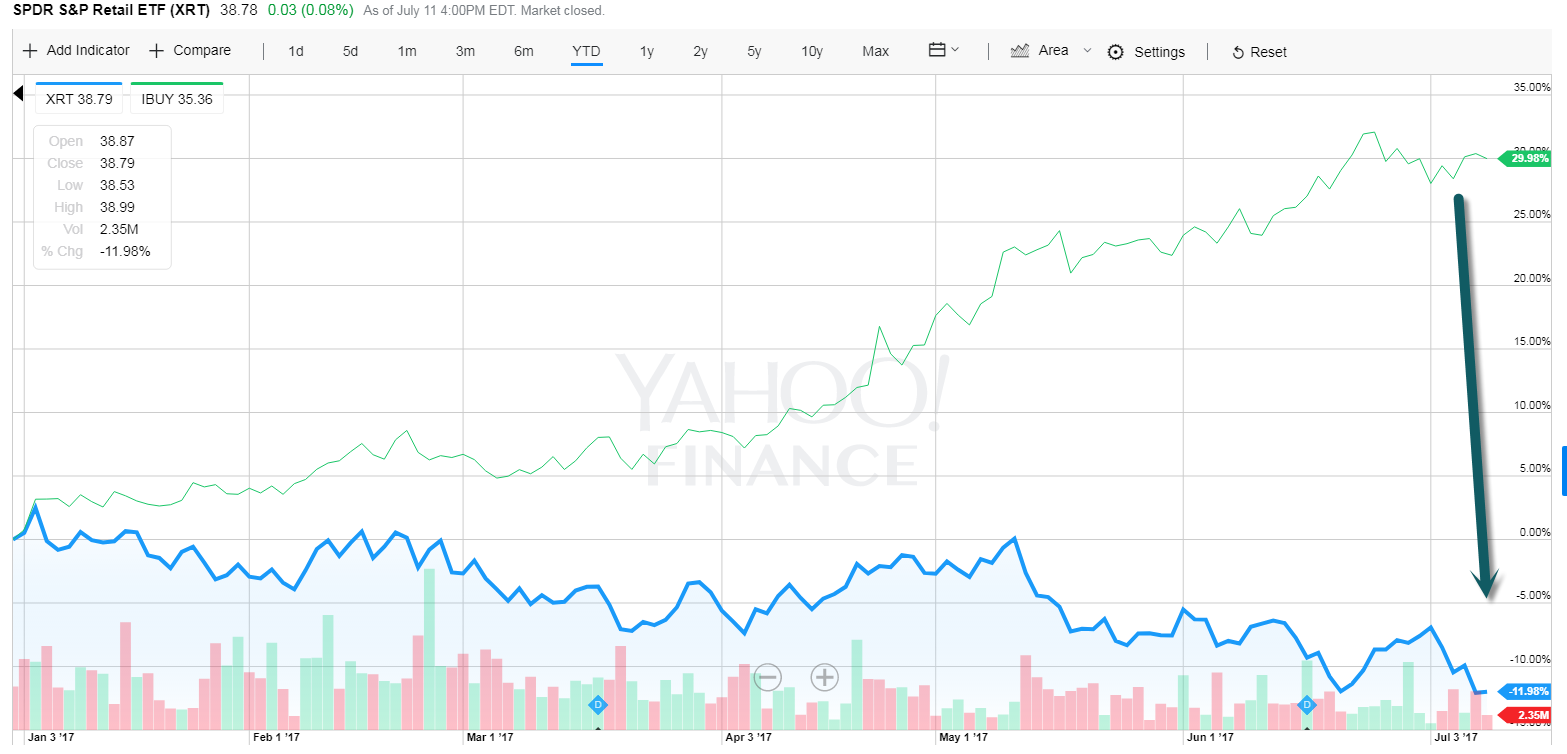
IBUY Top Holdings.
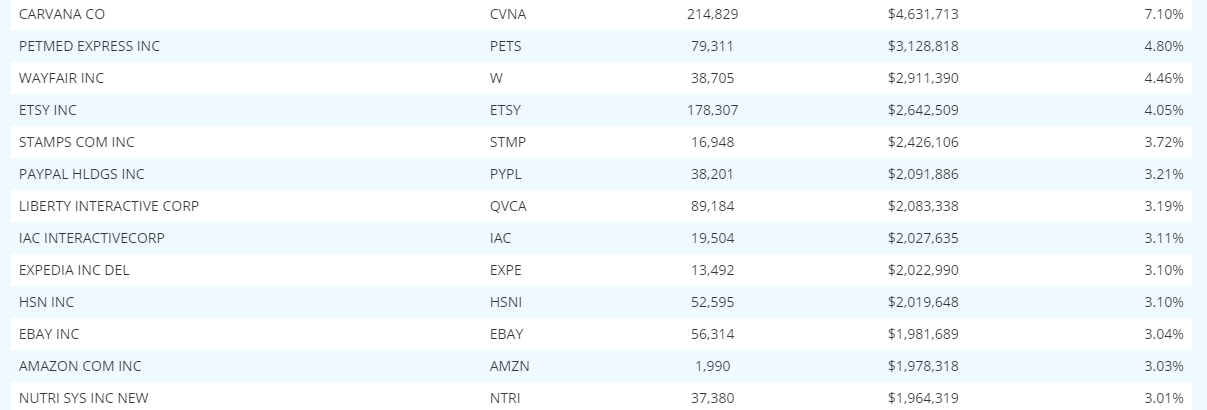
https://www.amplifyetfs.com/ibuy-holdings
2. Follow up to my Color me Skeptical on Middle Eastern State Energy IPOs.
Fossil fuels are no longer the largest recipient of investment in the energy industry, according to the latest report from the IEA. The electricity sector received the largest level of investment for the first time ever, growing its share by 12 percentage points to 43% between 2014 and 2016. In comparison, over the same period, investments in upstream (exploration and production) oil and gas fell 44%.
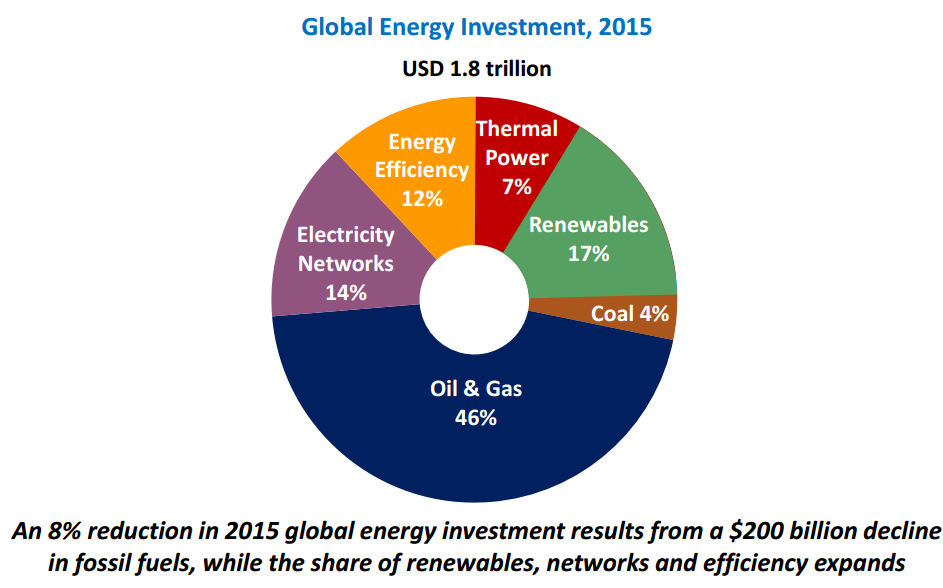
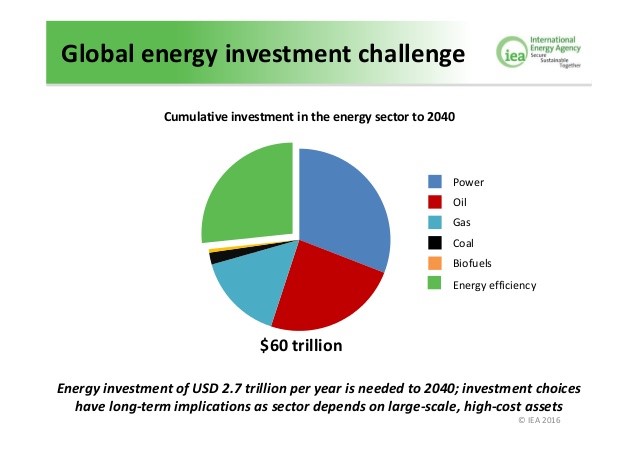
3.Positive Correlation Between Interest Rates and Equities??
Torsten Slok
Many clients ask me what I think will happen to equities when interest rates go up. The chart below shows that we are currently in a regime where higher interest rates are associated with higher stock prices. In the 1970s and 1980s when we had high inflation the correlation was the reverse. I think inflation will remain under control and near the Fed’s 2% target. As a result, higher interest rates are likely to continue to be associated with higher stock prices. The main risk to stock prices is a recession, and we continue to see a very low probability of a recession over the coming 12 months, see also my latest monthly chart book here: http://pull.db-gmresearch.com/cgi-bin/pull/DocPull/1-E869/18475509/US_Economic_Outlook_30June17.pdf and our GEP here: http://pull.db-gmresearch.com/cgi-bin/pull/DocPull/10974-A798/229809872/DB_GEP_2017-06-12_63bf3d4c-4c1e-11e7-935a-5dc1fa8433f4_604.pdf
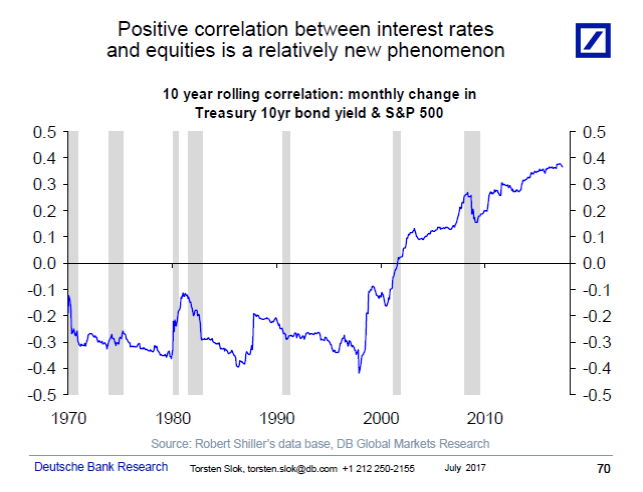
4.China New Highs for the Year
Bolstered by firm global demand and robust appetite for construction materials at home, China posted stronger-than-expected trade figures for June. Exports from the world’s second-largest economy rose 11.3% from a year earlier, while imports expanded 17.2%, resulting in a trade surplus of $42.77B. Trade tensions? The nation also posted its widest trade surplus with the U.S. since October 2015.
FXI China ETF New Highs 50day thru 200day to upside on weekly chart.
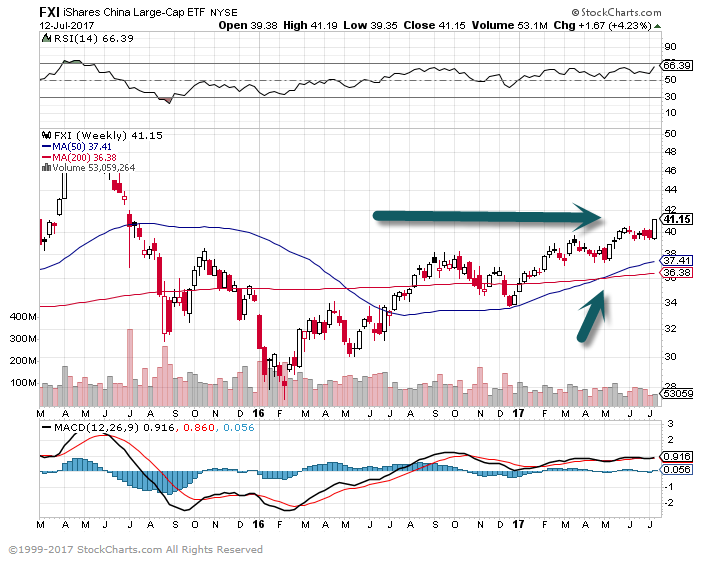
5.Euro Stoxx 600 Never Got Above 2015 Highs in this Rally.
6.Shale Output Revised Down for the First Time.
Bloomberg reports “The Energy Information Administration said Tuesday U.S. oil production will average 9.9 million barrels a day next year, 110,000 barrels less than last month’s estimate. It’s the first time the outlook for U.S. supply has slipped since the agency started posting 2018 estimates in January. ‘
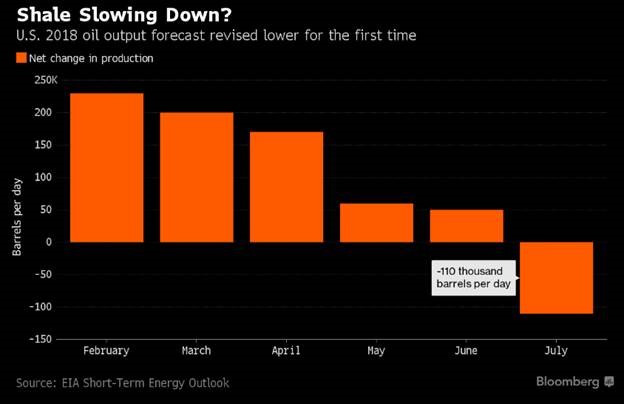
Thanks to Dave Lutz at Jones for Chart
7.The Most Hated Bull Market Ever…..Bullish Sentiment Hitting Lows.
132 Weeks and Counting — Jul 13, 2017
That’s the number of weeks it has been since bullish sentiment in the AAII sentiment survey has been above 50%, and this week it wasn’t even close. Even as the market has started to enter rally mode and the Nasdaq is getting back on its feet, bullish sentiment actually saw a slight decline, falling from its already depressed level of 29.58% down to 28.24%. That’s the lowest weekly print since the start of June.
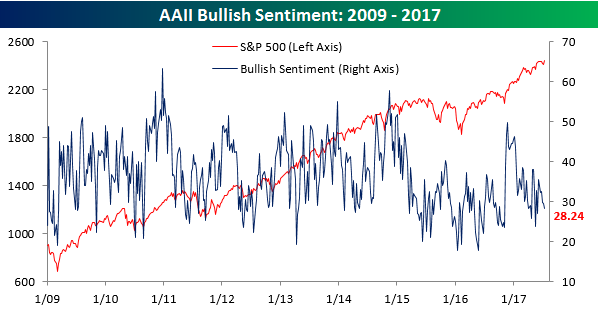
https://www.bespokepremium.com/think-big-blog/
8.Read of Day…Passive is 18% of Global Assets
The Asset Management Industry Is Shrinking
For the first time since the financial crisis, asset managers have seen their revenues and profits decline year-over-year, according to the Boston Consulting Group.
Diana Britton | Jul 11, 2017
Global assets under management of traditional asset managers grew 7 percent in 2016, to $69 trillion, but net new flows remained unchanged at 1.5 percent, according to a new Boston Consulting Group report. And the global profit pool decreased 2 percent, while net revenues fell 1 percent, marking the first year since the crisis the asset management industry has seen both revenues and profits decline year-over-year.
The dynamic is being driven by the downward pressure on asset management fees and the shift to passive investments, which BCG says is accelerating.
“Even in the more specialty asset classes—like small cap or emerging-market debt or high yield—people are going passive in those asset classes,” said Brent Beardsley, a BCG senior partner and global leader of the firm’s asset and wealth management segment.
Beardsley co-authored the report, Global Asset Management 2017: The Innovator’s Advantage, which found that net revenues as a share of AUM have been steadily declining over the last
three years. They fell from about 28 basis points in 2015 to 26.7 basis points in 2016. At the same time, operating profits as a share of net revenues declined from 39 percent in 2015 to 38 percent in 2016. But firms have also been controlling costs. In 2013, costs as a share of AUM were 18 basis points, compared with16.6 basis points at the end of 2016.
“Declining revenue line, declining costs—the industry is shrinking some as a result of this,” Beardsley said.
Advertising, Mouse Over For Audio
Fees for equity specialties—the highest-margin active product behind alternatives—are down 3.5 percent per year since 2010, the report said.

Globally, net flows have hovered around 1.5 percent for the last four years; U.S. managers saw outflows of 0.3 percent last year, driven by outflows from defined-benefit pension plans and a flat retail market.
In such a low flow environment, managers will have to rely on market appreciation, which is difficult, or gain market share to grow their businesses, Beardsley added. They have to differentiate themselves or access markets that are growing faster, such as China.
Active core—large-cap domestic equities, domestic government and corporate fixed income, money market, and structured products—has been a shrinking portion of global AUM, declining from nearly 60 percent of global assets in 2003 to 35 percent in 2016. BCG expects that to further decline to 29 percent by 2021.
“We now think that going forward by 2021 it’ll be less than 30 percent, with alternatives, solutions and passive making up the bulk of the growth there,” Beardsley said.
Alternative investments are expected to make up 16 percent of global AUM by 2021, but 43 percent of global revenues.
Passive currently accounts for 18 percent of global assets, and that’s expected to grow to 20 percent by 2021. Yet it’s currently only 6 percent of global revenue, the report says.
“Everybody gets very excited about passive,” Beardsley said. “Everyone thinks about their passive strategy. And that’s clearly right from an AUM perspective. But in terms of revenue, it’s not that big.”
9.Read of Day…Coffee Helps You Live Longer.
4 major studies find coffee drinkers may live longer — even those ordering decaf
Tall, grande or venti? Your answer may depend on whether you believe this.
People who drink three to five cups of coffee a day may be less likely to die prematurely from some illnesses than those who drink less coffee or don’t drink any coffee at all, according to two major new studies released this week.
One study published in the Annals of Internal Medicine journal studied 521 330 people in 10 European countries over 16 years and found a statistically significant lower mortality rate among coffee drinkers. A second study in the same journal looked at 185 855 African-Americans, Native Hawaiians, Japanese-Americans, Latinos and Caucasians aged 45 to 75 years over 9 years, and found similar trends for caffeinated and decaffeinated coffee.
This supports a 2015 study released by the Harvard T.H. Chan School of Public Health researchers and published online in the journal Circulation. In that 2015 study, drinkers of both caffeinated and decaffeinated also coffee saw benefits, including a lower risk of death from cardiovascular disease, neurological diseases, Type 2 diabetes and suicide. “Moderate consumption of coffee may confer health benefits in terms of reducing premature death due to several diseases,” said senior author Frank Hu, professor of nutrition and epidemiology at Harvard.
And a 2012 study of over 400,000 men and women published in The New England Journal of Medicine, also found an association between coffee drinkers and lower rates of mortality due to several diseases including stroke, respiratory diseases and diabetes.
The data include nearly 168,000 women in the Nurses’ Health Study and look at factors influencing women’s health, plus 40,557 men in the Health Professionals Follow-up Study, started in 1986 and designed to complement the Nurses’ Health Study, sponsored by the Harvard School of Public Health and the National Cancer Institute. Coffee drinking was assessed using validated food questionnaires every four years over about 30 years. During the study period, 19,524 women and 12,432 men died from a range of causes.
Why the health benefits? “Bioactive compounds in coffee reduce insulin resistance and systematic inflammation,” said fellow author Ming Ding, a doctoral student in the Department of Nutrition at the Harvard School of Public Health. “That could explain some of our findings.” Antioxidants in coffee may also help protect cells and prevent chronic diseases. More studies are needed to investigate the biological mechanisms producing these effects, Ding added. (Co-author Rob van Dam received research funding from Nestec S.A., a subsidiary of Nestlé NESN, +0.18% for an earlier study.)
Despite the ubiquity of coffee shops, Americans are drinking roughly about half of what they did in the post-World War II years when most people drank about 48 gallons a year on average, according to data from the U.S. Department of Agriculture, previously cited by MarketWatch. Though in those days most Americans drank uber-boiled coffee from canned, pre-ground beans, a pale (or, more likely, dark) imitation of the current array of flat whites, cappuccinos and Frappuccinos which can run up to as many as 560 calories for a venti (large).
But not everyone is a fan of coffee. This 2015 European Food Safety Authority study found that high doses of caffeine (more than 400 milligrams or four cups per day) were associated with panic attacks, anxiety and nervousness.) And another 2014 study in the journal Cancer Causes Control cast doubt on earlier research that suggested an association between coffee drinking and lower rates of prostate cancer in men. Despite studies casting doubt on the benefits of coffee, the drink has not suffered the same bad press as soda or even diet soda.
(This story was updated with new research.)
10.5 Lessons Most People Learn Way Too Late in Life
It’s best to learn these lessons while you’re still young.
“What are the lessons people most often learn too late in life?” originally appeared on Quora–the place to gain and share knowledge, empowering people to learn from others and better understand the world.
Answer by Alyssa Satara, co-founder at Refugee Code Academy, on Quora:
1. Perception is reality
It’s true. The way you interpret and understand the world directly affects your beliefs and the way you live your life. Perception creates bias as much as it creates understanding. It creates fear as much as it creates curiosity.
Do you want your reality to be narrow or vast?
Will the bliss that ignorance provides be sufficient, or do you need more?
The truth is most people want more. Even if it is on a subconscious level. Humans tend to trail blaze. From cradle to the grave, our society emphasizes the importance of education. Learning and discovering is what we do, but still it is increasingly hard to understand what you don’t understand.
So how do you learn to know what you don’t know? Start by asking yourself: What don’t I know? What do you want to learn more about?
Most importantly, understand that it’s OK to be wrong. In error there is growth.
2. Everything is temporary
Your good times are temporary and your bad times are temporary. So when you’re up, enjoy it, bask in it, and be grateful for it. And when you’re down, know you will get through it. Know that it’s not the end, and that it’s just a rough patch. Life is full of twists and turns, ups and downs, and surprises.
We forget that it’s about the journey not the destination.
There is a lesson in everything. I think it’s hard for a lot of people–especially young people–to appreciate life. Recognizing the full worth of your hardships and your blunders is key to appreciating the journey. It’s just as important to stay humble and be grateful for the joys life brings you.
Everything is temporary, so make the most out of all of it.
3. The importance of being present
“If you are depressed, you are living in the past. If you are anxious, you are living in the future. If you are at peace, you are living in the present.” —Lao Tzu
More often than not, we tend to worry about what’s to come, or dwell on something that’s already happened. While it’s crucial to care and consider your future, be careful not to let it hinder your present. Moments turn into memories. Enjoy the moment while you have it.
It usually takes a lifetime of piled up worries for a person to realize: Worrying isn’t productive.
Living in the past is equally unproductive. There are definitely benefits in being able to reflect on yourself and on your past. Paying attention to what you’ve been through and how that makes you feel matters. It takes a lot of emotional energy to grieve, process, and overcome.
The balance of being able to take time to reflect, and to prioritize your future while spending the majority of your day in the present, is beyond valuable, it’s life changing.
4. Do what you love, love what you do
There was a huge mosaic near my university in London that said that those words. I was grateful to walk past it almost every day and remind myself of the importance of loving your career and loving what you do. Your work is a considerably large aspect in your life that you dedicate yourself to. If you aren’t happy in your career, that unhappiness will seep into other aspects of your life. And while nothing is perfect, it’s important to work on yourself and position yourself to reach the goals and satisfactions you desire.
Most importantly: Invest in yourself.
This goes for your non-work life, too. What habits and hobbies do you want to stop? Which ones do you want to develop? It’s important to be conscious of the type of people and activities you surround yourself with. Information is like nutrients to your brain, be aware of what you are feeding yourself. Success isn’t one triumphant moment. Success is a series of moments (and choices) leading up to bigger moments.
You are the only person who can get in the way of living every day doing what you love.
Bob Dylan said it best when he said “What’s money? A man is a success if he gets up in the morning and goes to bed at night and in between does what he wants to do.”
5. Being happy takes work
The happiest people tend to be the ones who’ve worked the most on themselves. Being happy takes a lot of work. It’s just as much work–if not more– to be unhappy. So choose wisely. Being happy means at some point you decided to take control of your life. It means you decided to not be a victim and to put that energy back into yourself. Sometimes it’s hard, but you have to pull yourself up and push yourself forward.
Your lifetime is a series of developments and personal growth.
One of the worst things you can do for self-development is comparing yourself to other people. It’s easy to get caught up in jealousy and wanting what other people have. Especially with the way we interact with social media. You have to remember that people tend to show only the best parts of their lives on those platforms. It’s not fair to yourself when you see that and think “I want to do that” or “I want to look like that”. Not only does that distract you from being appreciative of what you have in our own life, it doesn’t provide any productive input to yourself. Most often, your perception of someone’s life is a fallacy. And even if it isn’t, focus on yourself. It’s your journey and your path that you should be concerned with.
Being happy takes practice. Whether it’s you learning to let go of your ego, or forming more self-loving habits…it takes practice. You only have one life, work as hard as you can to make it your best life.
This question originally appeared on Quora–the place to gain and share knowledge, empowering people to learn from others and better understand the world. You can follow Quora on Twitter, Facebook, and Google+. More questions:
https://www.inc.com/quora/5-lessons-most-people-learn-way-too-late-in-life.html?cid=hmmore
 www.stockcharts.com
www.stockcharts.com